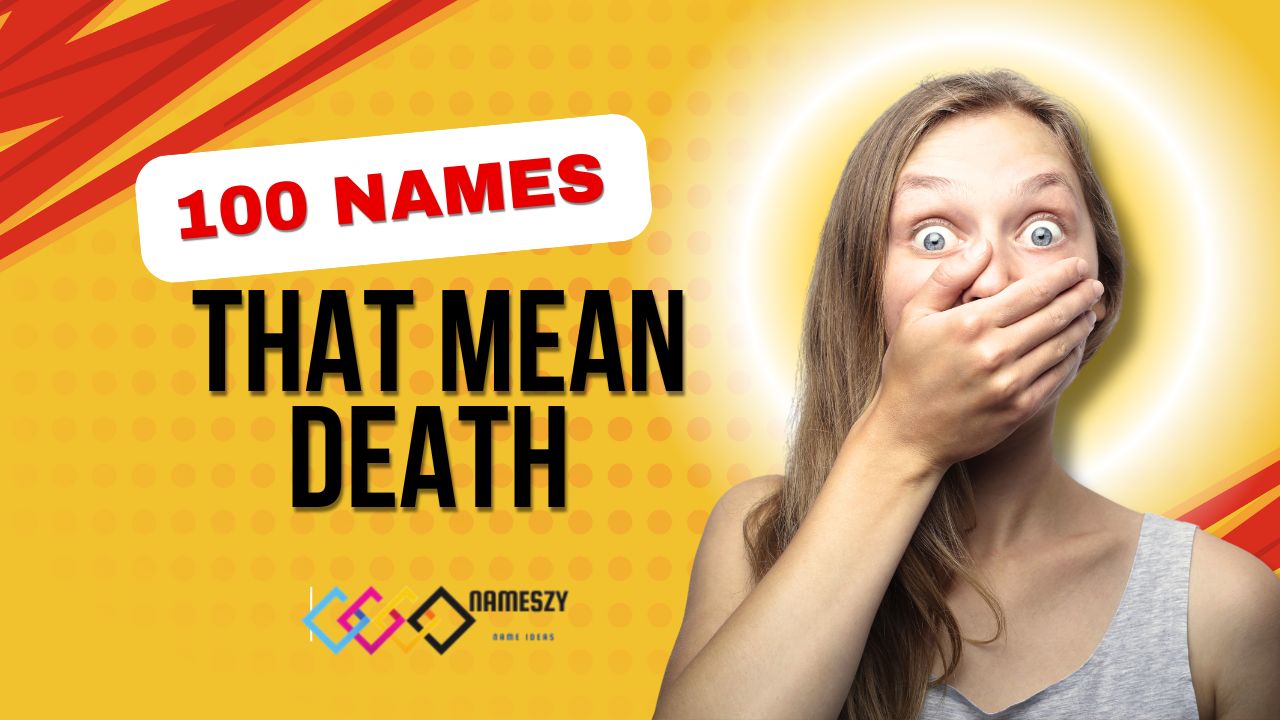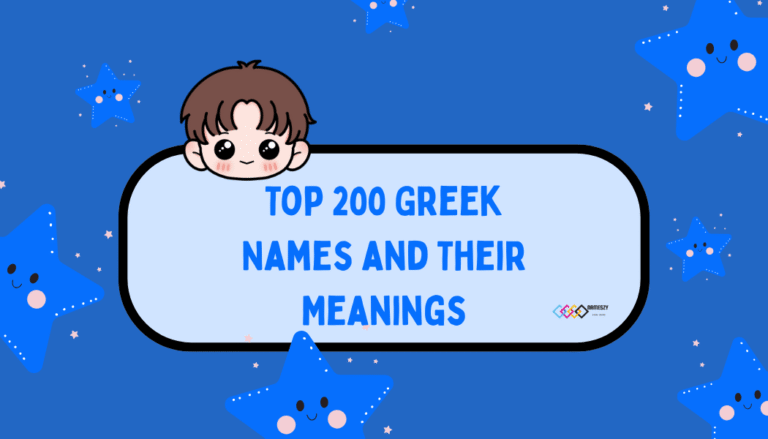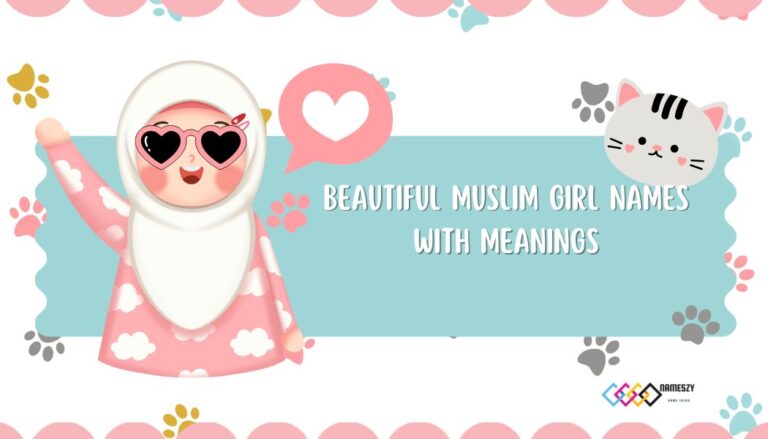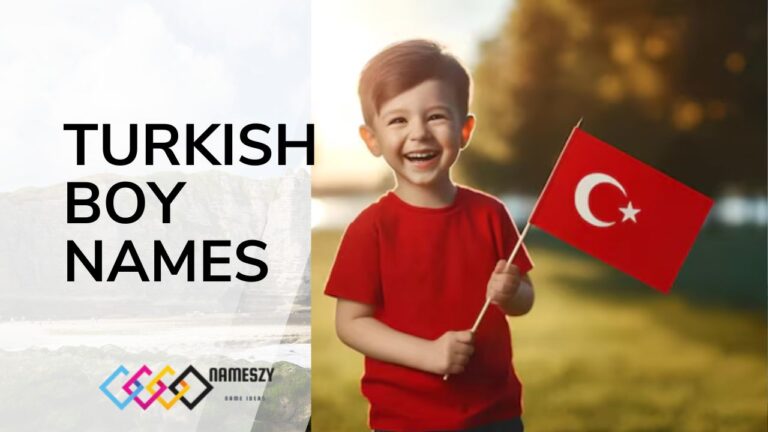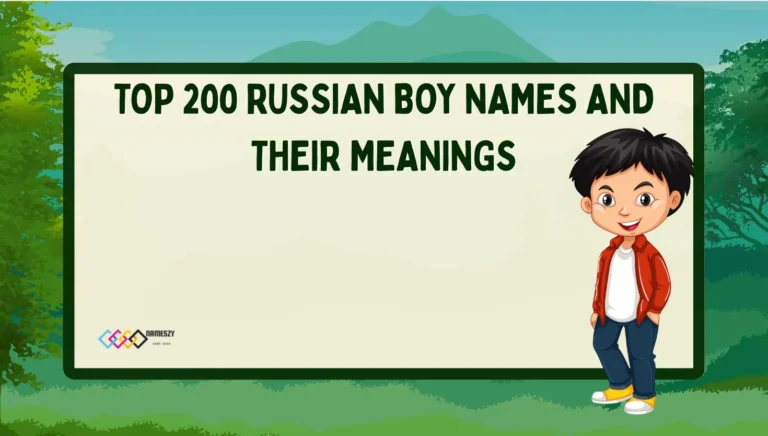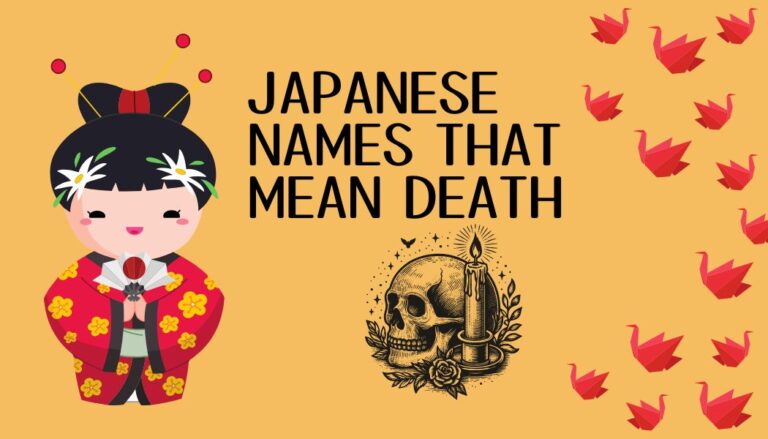100 Names That Mean Death (And Their Deep Meanings)
Names that mean death hold a unique allure—evoking mystery, transformation, and timeless power. Whether you’re naming a fictional character, choosing a meaningful tattoo, or exploring deeper spiritual symbolism, names associated with death often carry profound emotional and cultural significance.
Across civilizations, from the shadowy myths of Ancient Greece to the poetic afterlife beliefs of Eastern traditions, death has been personified, revered, and even romanticized. Linguistically, these names stem from roots that symbolize endings, transitions, and the metaphysical unknown.
This curated list of 100 names that mean death dives into these diverse origins, unearthing meanings that span mythology, folklore, and language—offering insight for creators, parents, and seekers of symbolism alike.
What Makes a Name Mean ‘Death’?
A name that “means death” often carries layers of linguistic, cultural, and mythological symbolism. Linguistically, many death-related names derive from ancient languages where roots like mort, than, or nekros directly translate to death, darkness, or decay—revealing the etymology of death-related names.
Mythologically, countless cultures have personified death through gods, spirits, or creatures of the underworld, leading to names such as Thanatos (Greek), Hel (Norse), or Mictlantecuhtli (Aztec) that embody symbolic death meanings. These names often reflect not just physical death, but broader concepts like spiritual transition, rebirth, or the shadow self.
Whether drawn from underworld mythology or linguistic symbolism, such names carry a deep resonance, often used in storytelling, esotericism, and personal expression to evoke the mystery of life’s ultimate transformation.
Popular Cultures and Their Death-Linked Names
Across the world, cultures have developed unique relationships with the concept of death, and this is reflected vividly in the names they’ve passed down through generations. From the feared yet respected Thanatos of Ancient Greece to the serene, goddess-like Hel of Norse legend, names rooted in underworld mythology often carry rich symbolic death meanings.
In Japanese culture, figures like the Shinigami—gods or spirits of death—offer names that blend fear and spiritual transition. Meanwhile, African and Mesoamerican traditions include names tied to ancestral spirits and deities of the afterlife, revealing powerful connections between identity and the cycle of life and death.
These culturally significant names not only reflect deep-seated beliefs but also serve as a linguistic window into how humanity views mortality, making them highly meaningful for those seeking names steeped in myth, symbolism, and cultural legacy.
Greek and Roman Mythology
| Name | Meaning | Origin |
|---|---|---|
| Thanatos | God of peaceful death | Greek Mythology |
| Hades | God of the underworld | Greek Mythology |
| Persephone | Queen of the underworld | Greek Mythology |
| Charon | Ferryman of souls to the underworld | Greek Mythology |
| Nyx | Primordial goddess of night and darkness | Greek Mythology |
| Erebus | Personification of deep darkness and shadow | Greek Mythology |
| Hypnos | God of sleep, twin brother of Thanatos | Greek Mythology |
| Lethe | River of forgetfulness in the underworld | Greek Mythology |
| Achlys | Spirit of death-mist, associated with sorrow | Greek Mythology |
| Melinoë | Underworld goddess associated with ghosts | Greek Mythology |
| Macaria | Goddess of blessed death | Greek Mythology |
| Tartarus | Deep abyss used as a dungeon of torment | Greek Mythology |
| Ker (Keres) | Spirits of violent death | Greek Mythology |
| Moirai (Fates) | Three goddesses controlling life and death | Greek Mythology |
| Clotho | Fate who spins the thread of life | Greek Mythology |
| Lachesis | Fate who measures the thread | Greek Mythology |
| Atropos | Fate who cuts the thread of life | Greek Mythology |
| Orcus | God of the dead and punisher of broken oaths | Roman Mythology |
| Dis Pater | Roman god of the underworld | Roman Mythology |
| Pluto | Roman equivalent of Hades | Roman Mythology |
| Mors | Roman personification of death | Roman Mythology |
| Nox | Roman goddess of the night (equivalent of Nyx) | Roman Mythology |
| Somnus | Roman god of sleep (equivalent of Hypnos) | Roman Mythology |
| Libitina | Roman goddess of funerals and burial | Roman Mythology |
| Mania | Goddess of the dead and madness | Roman Mythology |
| Lemures | Restless spirits of the dead | Roman Mythology |
| Larvae | Malevolent ghosts or spirits | Roman Mythology |
| Avernus | Mythical entrance to the underworld | Roman/Latin Tradition |
| Proserpina | Roman equivalent of Persephone | Roman Mythology |
| Furina | Goddess associated with secret rites and the dead | Roman Mythology |
Norse Mythology
| Name | Meaning | Origin |
|---|---|---|
| Hel | Goddess of the underworld and ruler of Helheim | Norse Mythology |
| Fenrir | Monstrous wolf destined to kill Odin during Ragnarök | Norse Mythology |
| Jörmungandr | World Serpent; associated with destruction at Ragnarök | Norse Mythology |
| Niflheim | Realm of fog, cold, and the dead | Norse Mythology |
| Valhalla | Hall of slain warriors ruled by Odin | Norse Mythology |
| Valkyrie | Choosers of the slain who escort warriors to Valhalla | Norse Mythology |
| Odin | Allfather, associated with wisdom and death | Norse Mythology |
| Freya | Goddess who receives half of the dead in Fólkvangr | Norse Mythology |
| Fólkvangr | Afterlife field ruled by Freya | Norse Mythology |
| Skuld | One of the Norns; linked to future and fate of the dead | Norse Mythology |
| Urd (Urðr) | Norn representing the past and fate | Norse Mythology |
| Verdandi | Norn representing the present | Norse Mythology |
| Garmr | Blood-stained watchdog of Helheim | Norse Mythology |
| Ragnarök | The end-of-world prophecy, linked to death and rebirth | Norse Mythology |
| Yggdrasil | Tree connecting worlds, including the realm of the dead | Norse Mythology |
| Huginn | Odin’s raven; symbolizes thought and death omens | Norse Mythology |
| Muninn | Odin’s raven; symbolizes memory and mortality | Norse Mythology |
| Draugr | Undead Norse spirits that guard treasure | Norse Mythology |
| Einherjar | Slain warriors in Valhalla preparing for Ragnarök | Norse Mythology |
| Naglfar | Ship made of dead men’s nails, sails during Ragnarök | Norse Mythology |
| Hvergelmir | Source of cold rivers in Niflheim | Norse Mythology |
| Modgud (Móðguðr) | Guardian of Gjallarbrú bridge to Hel | Norse Mythology |
| Gjöll | River separating the realm of the dead | Norse Mythology |
| Gjallarbrú | Bridge to Helheim, crossed by souls | Norse Mythology |
| Mist | Valkyrie name, symbolizes fog and mystery | Norse Mythology |
| Hrist | Valkyrie; name means “the quaking one” | Norse Mythology |
| Skeggjöld | Valkyrie; name means “axe-time” | Norse Mythology |
| Thrud | Valkyrie; name means “strength” | Norse Mythology |
| Brynhildr | Shieldmaiden and Valkyrie; tragic fate in death | Norse Mythology |
| Kara | Valkyrie name meaning “stormy one” | Norse Mythology |
Japanese & Asian Names
| Name | Meaning | Origin |
|---|---|---|
| Shinigami | Death god or spirit that brings death | Japanese Folklore |
| Yami | Darkness; also the land of the dead | Japanese Mythology |
| Enma (Yama) | King of Hell; judge of the dead | Japanese / Hindu |
| Kuro | Black, symbolic of darkness or death | Japanese Language |
| Kagutsuchi | Fire god whose birth caused death of his mother | Japanese Mythology |
| Onryō | Vengeful spirit causing death or misfortune | Japanese Folklore |
| Yūrei | Ghost or spirit of the dead | Japanese Culture |
| Kuroshi | Death from overwork | Japanese Term |
| Fujin | God of wind, associated with natural death | Japanese Mythology |
| Izanami | Goddess of death and creation | Japanese Mythology |
| Izanagi | Creator god who visited the underworld | Japanese Mythology |
| Yomi | Underworld; land of the dead | Japanese Mythology |
| Tamashii | Soul or spirit | Japanese Language |
| Kage | Shadow or silhouette | Japanese Language |
| Akuma | Demon; death bringer | Japanese / Asian Folklore |
| Kami | Spirit or god (can include deathly forms) | Shinto Religion |
| Shi | Number four; homophone for “death” | Japanese Language |
| Kichiku | Brutal spirit or fiend | Japanese Language |
| Meifu | Another term for the underworld | Japanese Mythology |
| Gaki | Hungry ghost spirit | Japanese / Buddhist |
| Rakshasa | Demonic entity tied to death | Hindu / Buddhist |
| Mara | Spirit of death and temptation | Buddhist Tradition |
| Kalagni | Time-fire; destructive deity | Hindu Mythology |
| Yasha | Warrior demon spirit | Hindu / Buddhist |
| Naraka | Hell realm of punishment | Hindu / Buddhist |
| Preta | Spirit suffering after death | Buddhist Tradition |
| Samsara | Cycle of death and rebirth | Hindu / Buddhist |
| Reikon | Soul between life and afterlife | Japanese Culture |
| Obake | Ghost that can shape-shift | Japanese Folklore |
| Jikininki | Flesh-eating ghost spirit | Japanese Buddhist Lore |
Gothic & Dark Fantasy Inspired Names
| Name | Meaning / Symbolism | Origin / Style |
|---|---|---|
| Raven | Symbol of death, prophecy, and mystery | Gothic Symbolism |
| Onyx | A dark stone linked to grief and mourning | Gothic Gemstone Lore |
| Nyxara | Invented name, inspired by “Nyx,” goddess of night | Dark Fantasy |
| Draven | “Hunter of shadows” or dark one | Gothic / Modern Fantasy |
| Mortis | Latin for death | Latin / Fantasy |
| Lilith | Night demon; first woman in some legends | Occult / Dark Feminine |
| Nocturne | Night music or atmosphere | Gothic Romanticism |
| Shade | Spirit or ghost | Dark Fantasy |
| Belladonna | Poisonous plant; deadly beauty | Gothic Botany |
| Dante | Symbol of journey through death | Classic Gothic Lit |
| Morwen | “Maiden of darkness” (Tolkien-inspired) | High Fantasy |
| Zephyrine | Dark wind spirit | Gothic Romantic / Greek |
| Obsidian | Volcanic glass, black as night | Gothic Mineral Lore |
| Velora | Invented name, “dark beauty” | Fantasy / Gothic |
| Vespera | Evening star, twilight | Latin / Gothic Tone |
| Caligo | “Mist” or “dark fog” | Latin Fantasy Name |
| Lucien | Light-bearer with gothic twist | Gothic Romance |
| Thorne | Sharp, painful, symbolic of dark barriers | Gothic Symbolism |
| Alaric | Noble ruler; often villainous | Gothic / Medieval |
| Salem | Town linked with witch trials | Dark Occult / Gothic |
| Crimson | Color of blood; evokes gothic elegance | Gothic Aesthetic |
| Morrigan | Celtic goddess of death and battle | Dark Myth / Fantasy |
| Ebon | Deep black, poetic term | Gothic Poetics |
| Desdemona | “Ill-fated”; tragic name from Shakespeare | Gothic Literature |
| Tempest | Storm; turmoil; chaos | Gothic Imagery |
| Noir | French for black; genre and aesthetic | Gothic Noir |
| Umbra | Shadow; partial darkness | Latin / Occult |
| Sable | Black; darkness; heraldic color | Gothic / Medieval |
| Vlad | Linked to Vlad the Impaler / Dracula | Vampire Lore |
| Seraphine | Angelic name with dark elegance | Gothic Angelic Style |
African & Tribal Names
| Name | Meaning / Symbolism | Origin / Culture |
|---|---|---|
| Owuo | Personification of death | Akan (Ghana) |
| Abiku | Spirit child destined to die young | Yoruba (Nigeria) |
| Ekwensu | Trickster spirit linked to death | Igbo (Nigeria) |
| Anansi | Fate-trickster linked to mortality | Ashanti (Ghana) |
| Esu | Messenger god of death | Yoruba |
| Kalunga | Boundary between life and death | Kongo (Central Africa) |
| Nommo | Water spirits linked to life and death | Dogon (Mali) |
| Ntu | Spiritual force of life and death | Bantu |
| Loa Ghede | Vodou spirit of death | Haitian Vodou / West Africa |
| Baron Samedi | Lord of the cemetery | Haitian Vodou / Africa |
| Mokèlé-mbèmbé | Mythical serpent of death | Congo Folklore |
| Nzambi | Supreme being of death and creation | Bakongo |
| Mpaka | Guardian of spirits | Bantu |
| Chukwu | Supreme god; fate and death | Igbo |
| Kibuka | War god turned death spirit | Baganda (Uganda) |
| Mbwiri | Ancestral spirit possessing people | Fang (Gabon) |
| Dlozi | Spirit of ancestors | Zulu (South Africa) |
| Shango | Thunder god linked with death | Yoruba |
| Obatala | God of the soul and afterlife | Yoruba |
| Orunmila | Oracle deity who sees death’s path | Yoruba |
| Nananom Nsamanfo | Revered ancestral spirits | Akan |
| Yeneenga | Ancestral warrior spirit | Mossi (Burkina Faso) |
| Ile Orun | Heavenly realm of ancestors | Yoruba |
| Nambi | Spirit of balance and fate | Baganda (Uganda) |
| Tano | River deity connected to endings | Akan |
| Adroa | God of death and creation | Lugbara (Uganda) |
| Ogoun | War Loa; brings death and justice | Vodou / Yoruba |
| Ala | Earth goddess overseeing death | Igbo |
| Ashé | Spiritual power behind death and fate | Yoruba |
| Mwari | Supreme creator and judge of souls | Shona (Zimbabwe) |
Modern & Fictional Death-Linked Names
| Name | Meaning / Role | Source / Universe |
|---|---|---|
| Ryuk | Shinigami who drops the Death Note | Death Note (Anime) |
| Thanos | Wipes out half of life, name inspired by Thanatos | Marvel Comics |
| Death | Personification of death | Sandman / Discworld |
| The Reaper | Grim Reaper; classic death entity | Various / Pop Culture |
| Ronan | Accuser who brings death and justice | Marvel Comics |
| Azrael | Angel of Death | DC / Abrahamic Lore |
| Sephiroth | Antagonist with god-like death powers | Final Fantasy VII |
| Alucard | Vampire, reverse of Dracula | Hellsing / Castlevania |
| Light Yagami | Human who uses Death Note to kill | Death Note |
| The Lich | Immortal death sorcerer | Adventure Time / D&D |
| Nagini | Dark serpent linked to death | Harry Potter |
| Dementor | Death-like creature that sucks the soul | Harry Potter |
| Voldemort | “Flight of death”; death-obsessed villain | Harry Potter |
| Malak | Sith Lord who brings death | Star Wars: KOTOR |
| Darth Vader | Bringer of death and destruction | Star Wars |
| Noob Saibot | Wraith assassin symbolizing death | Mortal Kombat |
| Reaper (Overwatch) | Wields death powers; resurrected killer | Overwatch |
| The Nameless One | Undead immortal seeking death | Planescape: Torment |
| Hades | God of the Underworld | Hades (Game) |
| Makuta | Masked bringer of death and darkness | Bionicle |
| Spawn | Antihero who returns from the dead | Spawn Comics |
| Lucifer | Fallen angel, bringer of death | DC Comics |
| Deadpool | Mercenary who cheats death | Marvel Comics |
| Ghost Rider | Spirit of vengeance | Marvel Comics |
| Deathstroke | Assassin and mercenary | DC Comics |
| Corvo Attano | Assassin with powers over life and death | Dishonored |
| Bayonetta | Witch who fights angels and demons | Bayonetta |
| Riku | Hero using darkness against death | Kingdom Hearts |
| Kratos | Kills gods and defies death | God of War |
| Chrollo Lucilfer | Leader of deadly Phantom Troupe | Hunter x Hunter |
Why Choose a Name That Means Death?
Choosing a name that means death is not necessarily about celebrating the end—it’s often about honoring transformation, mystery, and symbolic power. For many, names tied to death carry a profound sense of spiritual rebirth, representing cycles of endings and new beginnings.
Whether used for a gothic baby name, a fictional character, or a symbolic persona in art or gaming, these names evoke a dark aesthetic that appeals to those drawn to the shadowy or mystical aspects of life.
Culturally and spiritually, death is not always an endpoint but a portal—something to be respected, personified, or even romantically reimagined. In this way, death-linked names become vessels of identity that express depth, resilience, and a fascination with the unknown.
Frequently Asked Questions
What is the meaning of the name Thanatos?
Thanatos is a name from Greek mythology that means “death”. He was the personification of peaceful death, often portrayed as a winged spirit or a young man. Thanatos represents a calm and natural passing, distinct from violent or chaotic forms of death associated with other mythological figures.
Are names that mean death suitable for babies?
Yes, many parents today choose gothic baby names or symbolic names linked to death for their children to reflect strength, transformation, or spiritual meaning. While traditional societies might view these names as taboo, modern perspectives often embrace them for their dark elegance, emotional depth, and unique aesthetic appeal.
What cultures use death names in mythology?
Death-related names appear across Greek, Norse, Roman, Japanese, African, and Hindu mythologies, among others. Each culture offers unique names that reflect their view of the afterlife, spirits, and death gods—from Hades and Hel to Shinigami and Owuo, these names are deeply rooted in ancestral beliefs and symbolic traditions.

